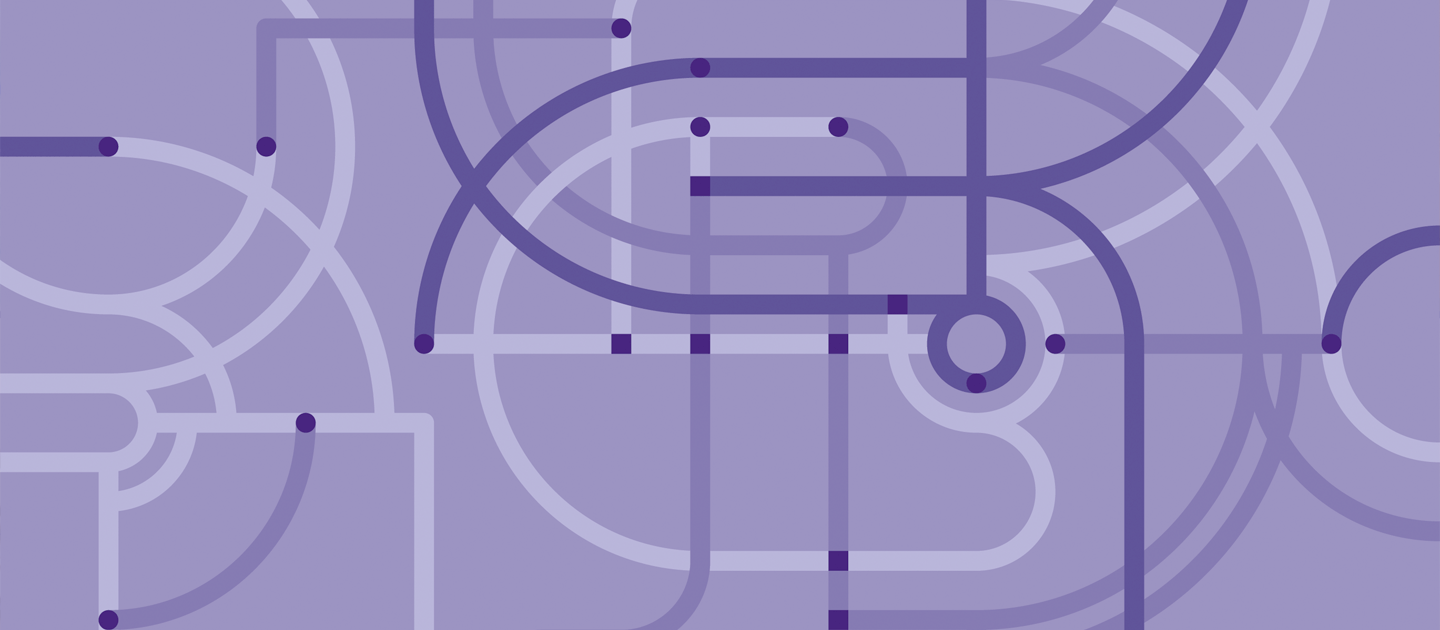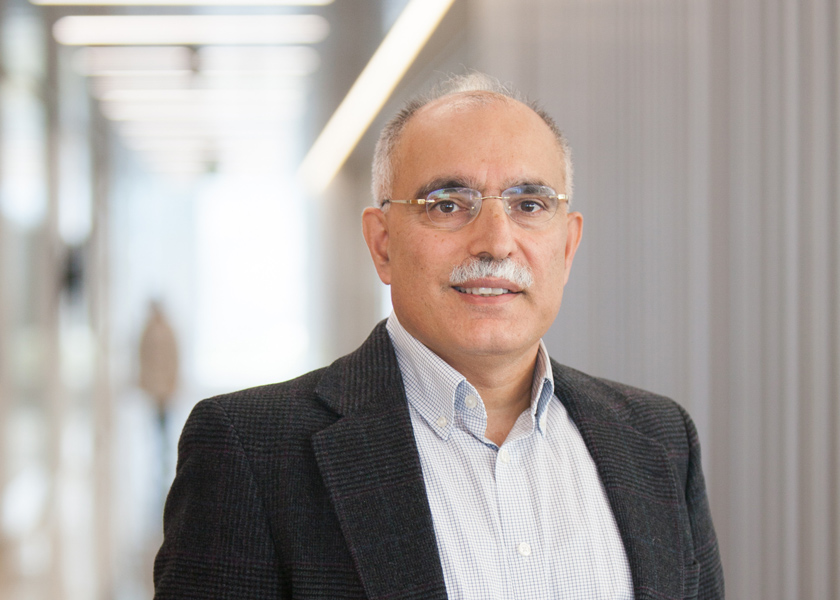2022 CS Annual Award Winners
Aldo Aguilar is developing a haptic app to enable blind and visually impaired users of audio recording workstations to feel the output of visual displays.

Computers and computational thinking permeate practically every aspect of human endeavor—from the purely social to the highest levels of enterprise worldwide. Their impact is perhaps most obvious in technology-driven disciplines where they have inspired groundbreaking innovation.
Behind these innovations are computer science researchers who pave the way for new and better systems both within the field and beyond it. As demand for such research has grown, so have computer science departments across the country.
The McCormick School of Engineering’s Department of Computer Science—Northwestern CS—exemplifies that growth, having become in its short history a hub of interdisciplinary research across the University and a magnet for some of the brightest minds in the field. Samir Khuller, inaugural Peter and Adrienne Barris Chair of Computer Science, attributes the department’s rapid expansion to the University’s “investment in the growth of people.”
Since 2016, Northwestern CS has hired 16 new tenure-track faculty members and 10 fully integrated teaching-track faculty and plans to hire nine additional faculty in the coming years. The department’s faculty hiring strategy has centered around pinpointing and strengthening existing core research areas—including data science and network security—with a relatively small footprint.
“We’re not going to be able to do everything,” Khuller says. “We have to be strategic about what we do, and we also have to be strategic about what we decide not to do.”
The department’s expansion has also led to the launch of new institutes and research collaborations that aim to accelerate transformative advances in the field. “We seek to leverage the power of data and computation to address the grand challenges of this century," Khuller says. "These innovative partnerships advance our research and help train our students in creative problem-solving."
In 2019, Northwestern faculty helped launch the multidisciplinary Institute for Data, Econometrics, Algorithms, and Learning (IDEAL). There, faculty, students, and researchers study machine learning and optimization, high-dimensional data analysis and inference, and emerging topics including reliability, interpretability, privacy, and fairness.
Through its research, training, and outreach activities, IDEAL aims to broaden local and national participation in data science and bridge the theoretical foundations of data science and the practice of data science in industry and applied science.

“You see data science used in every walk of life, but there are so many fundamental data science questions that we don’t understand,” says institute site director Aravindan Vijayaraghavan, associate professor of computer science. “There’s a lot that theory can contribute, and we hope these collaborations will spark new areas of research.”
Underscoring the institute’s success, the National Science Foundation has awarded it a $10 million grant as part of the foundation’s Harnessing the Data Revolution: Transdisciplinary Research in Principles of Data Science Phase II program. With the new funding, more than 60 investigators in computer science and across fields will collaborate with Google Research, the Illinois Institute of Technology, the Toyota Technological Institute at Chicago, the University of Illinois Chicago, and the University of Chicago.
As network security becomes paramount across a wide range of industries, Northwestern CS has continued to expand its footprint. The Northwestern Security and Privacy Group recently appointed four faculty members who have considerably expanded the group’s work in software and system security, network security, artificial intelligence (AI) security, cryptography, and data privacy.
One of them, V. S. Subrahmanian, Walter P. Murphy Professor of Computer Science and a faculty fellow at the University’s Roberta Buffett Institute for Global Affairs, is building global early warning systems for both terrorist attacks and cyberattacks. Another, Xinyu Xing, associate professor of computer science, and his team recently uncovered an eight-year-old security vulnerability in the Linux kernel and participated in two prestigious security contests: Pwn2Own and DEF CON.
Sruti Bhagavatula, assistant professor of instruction, launched the department’s first data privacy course in winter 2022 with the goal of balancing discussion and analysis of privacy topics with the hands-on implementation of technical solutions. Xiao Wang, assistant professor of computer science, and PhD student Chenkai Weng, won runner-up for Best Paper Award at the 2021 Association for Computing Machinery Special Interest Group on Security, Audit and Control Conference on Computer and Communications Security for their research into zero-knowledge protocol to confront sophisticated security threats.
“The synergies we gain by boosting a research group are significant,” Khuller says. “Now we’re able to offer a variety of very strong advanced-level courses, which makes Northwestern an attractive place for top students.”
The number of computer science graduate students at Northwestern continues to grow. From a previous average of 10-15 incoming students per year, this year’s 35 new PhD students join the more than 120 current CS PhD students and additional students pursuing interdisciplinary or electrical and computer engineering degrees who are advised by CS faculty.
Northwestern CS’s postdoctoral program is also thriving, in part to startup packages for early-career faculty that allow them to hire postdocs to accelerate their research productivity soon after they join. Some postdocs, McCormick teaching fellows, launch and instruct courses while also conducting research.
Khuller credits the increased interest and enrollment to the department’s people-first approach. “Our growth in postdocs is a product of our investment in faculty, the new and core research areas we’ve strengthened, and grant funding we’ve received as a result,” he says. “Those postdocs help co-mentor graduate and undergraduate students. Our research groups and labs accelerate projects, which present interdisciplinary collaboration opportunities, advance the field, and further fortify research excellence. It’s a cycle we’re excited to continue.”
Aldo Aguilar is developing a haptic app to enable blind and visually impaired users of audio recording workstations to feel the output of visual displays.
Fardeem Munir, Roxanna Wilcox (’22), and Cindy Hu, students in Northwestern Engineering’s Design, Technology, and Research (DTR) program, earned top awards in the Undergraduate Category at the ACM CHI 2022 Student Research Competition.
Amil Dravid collaborates with Professor Aggelos Katsaggelos and faculty at CalTech and UC Berkley in the area of machine learning and computer vision. He completed an internship at Microsoft Research this summer.
Amy Guo directed Wildhacks 2022 and is planning Wildhacks 2023. She also worked in former Professor Josiah Hester’s Ka Moamoa – Ubiquitous and Mobile Computing Lab.
Larina Chen and Jiayan Luo led the Northwestern CS Career Development Program, fostering mentorship relationships among the 170 participants
Liam O’Carroll co-authored a paper with PhD student Vaidehi Srinivas and Professor Aravindan Vijayaraghavan on understanding a popular non-convex optimization heuristic called the Burer-Monteiro method that was accepted to NeurIPS 2022.
Peter Zhong submitted a paper to the ACM SIGPLAN POPL symposium this summer and started a new research project to design (and prove correct) a programming language for writing down processors that comes with automatic pipelining.